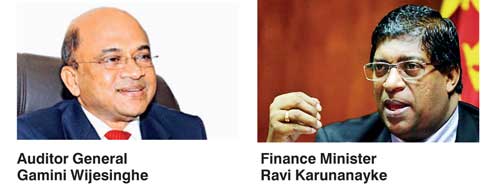Wednesday Feb 18, 2026
Wednesday Feb 18, 2026
Thursday, 26 January 2017 00:21 - - {{hitsCtrl.values.hits}}
By Daily FT News Desk
The Auditor General took centre stage in Parliament yesterday as both the Government and the Opposition stepped up to define the parameters of his powers after the contentious official released a decade’s worth of bond transaction details made by the Central Bank to COPE. 
Finance Minister Ravi Karunanayke returned to the House on the offensive, slamming the Auditor General for allegedly releasing the report to JVP Parliamentarian Bimal Ratnayake, despite COPE Chairman Sunil Handunetti clarifying at the start of proceedings that Ratnayake was given the report as he took over as COPE Chairman during a leave of absence by Handunetti.
Karunanyake was also supported by Prime Minister Ranil Wickremesinghe, who explained that the Central Bank was removed from the Finance Ministry purview to resolve “conflicts of interest” in fiscal discipline and budgetary oversight. “After several reminders, the Auditor General has delivered a set of volumes without a signed audit examination report. That information has also been delivered without using a closed official envelope, despite the sensitivity of information contained in the volume. Further, the examination requested has not been completed as yet.
In addition, he has stated that adequate time could not be spent for the examination due to the impatient and unethical reminders of the Minister of Finance, which leads to the breach of my privileges as a Minister,” Karunanyake said.
The Minister went onto describe the Auditor General as an “arrogant Government servant”, and insisted that despite being appointed by Parliament his responsibility was towards the Finance Minister as well.
“This has been committed by MP Bimal Ratnayaka during the debate. He said that there are officers with capacity and courage. That is true. Today we give that right to all officials, not only the Auditor General. We are revising the fact that democracy is reborn in the country. But that doesn’t mean that arrogant Government servants use power that is only in the hands of Parliament. The Auditor General is a creature of Parliament and answerable to Parliament, not to the general public that. These are matters of grave concern.”
The Auditor General was also faulted by the Finance Minister for simultaneously releasing the report to the Central Bank, as it contained sensitive information.
“This examination should contain information and find information strictly for my use, for the purpose of issuing new policies, for the issuance of government securities and for public debt management. The volumes contained a large pool of individual information and details of issuance of Government securities, which is highly market sensitive. A leak of information will adversely affect Government securities in raising funds for the budgetary requirement. This will raise the cost of borrowing. As I mentioned before, even in the past there have been a couple of officials at the Central Bank employed by the former Government. They are doing activities detrimental to the Government and it is a hand in glove situation.”
The JVP was joined by the Joint Opposition to vociferously defend the Auditor General’s action, arguing that it was done in the interests of transparency and public interest. The latter also questioned why the Government had not fulfilled its pledge to gazette the Auditor Commission in early January, which would strengthen the powers of the Auditor General and provide him with more clout. They also criticised the Finance Minister’s attempts to use a letter issued in 2004 to prevent the Auditor General releasing information to the House.
“The Bill has been drafted and the Finance Ministry is going through it. Maybe the Auditor General and the Finance Minister can get together and discuss it,” quipped the Prime Minister, noting that the Auditor Commission Bill would then be presented to Parliament.
“UNP members of COPE have never pressured the Auditor General. I have not received any complaints. We were the ones who asked that from this report, which contains bond transactions since 2008, the 2015 transactions be looked into first. We could have easily ensured it began in 2008,” said Wickremesinghe, rejecting accusations that the Government was attempting to prevent an investigation into the bond scam.
Wickremesinghe described the two volumes of the report by the Auditor General as being “not much helpful” to the investigation.
“I have discussed this matter with the Speaker, who has discussed with the Auditor General. He as agreed to avoid mentioning classified information. The report contained two volumes, the first was about the issues in the method. Anyway, no classified information was required to find the present information and he was able to present the report without classified information.”